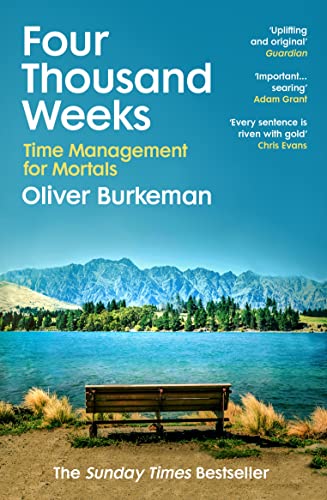Four Thousand Weeks: Embrace your limits. Change your life. Make your four thousand weeks count Vintage 2022
What is your relationship to time ? How long is that To Do list ? And what about those good intentions we start any day with? This Saturday started quite well – an early start and off to the market in Salisbury to pick up some asparagus via the dry cleaners. An excellent breakfast in Culture Coffee on Fisherton Street helped me move back into the driving seat of my aspiration for some productivity. Any week leaves unfinished business.
The e mail In Box needs a little more work – just a few more in the hope that it will empty and stop punishing me ( and others ) ….. I wonder what your list looks like?
My body slowed me up. A doze. Some washing. A tidy of a drawer that had gotten out of control – how very dare it? A catch up with a neighbour over the plastic recycling bin. Some milk from the corner shop. Fixing the Virgin Network signal to my TV helped by the most patient operative in the universe who ( I think) managed their frustration by talking to me very slowly. Then to the kitchen for soup making and a telephone call. Check twitter. Answer Facebook messages. Contact sister for a check up on Dad in Durham. And ….. and …. in between this book cross examined me and convicted me with its searing analysis of time!
Well – I say this book – or the remainder of the book to be truthful – I had tried to finish it twice but got distracted. I have been glad to be reminded of its themes and questions. So what’s it about ?
The average age of a human life is 4.000 weeks ( that’s 79ish If you haven’t got a calculator to hand. Work out from this equation how many weeks you have left! So what is our relationship to time? What might we do with our tomorrows? What is the meaning of it all? This book lies in-between a philosophical quest and a self help manual. I am with Burkeham on his quest for an empty e mail box, a to-do list that guides and judges and an abiding hope that there is an optimum level of productivity. I’d add to that a number of electronic devices and a filing system in a cabinet and on the desk that offers a hope of feeling on top of ‘stuff’ !
What exactly will help us to feel in control.
Don’t be put off by this so far – the book offers a history of time and the ideas that have shaped the cultures of time. I was especially interested in his proposition that the the sharp decline of faith in an afterlife has deeply re-calibrated our relationship to time. Time is finite. Time is pressured. Time is precious. Time is not to be wasted.
The flow of the text moves into some strategies for dealing with this – alas they do not include staying in bed all day with the duvet over your head! Here are some :
- Understand that we humans have limitations.
- Procrastination is unavoidable.
- We should get better at ignoring things.
- Stop being afraid of missing out !
- Settle down – there is no ideal job or partner.
- Happiness is a factor of what do you with the information you have.
- Don’t sacrifice the present moment for the future.
Productivity is given a thorough bashing as a dubious modern virtue.
“The Latin word for business, negotium, translates as not-leisure, reflecting the view that work was a deviation from the higher calling [of ease],”
Burkeham commends to his reader the hobbyist, takes an afternoon for no purpose. He warns us of wearing spectacles that focus our gaze only on the problems. And honestly you should read the book for the ten tips at the end. Do they work ? Lets see…..
In a world where we live with so much anxiety and frustration Burkeham cares for our mental health. What is this one life for? At points in the flow of the text I was reminded of the work of de Botton’s School of Life – they share a passion for our emotional intelligence and the need for us to break out of our prisons that may not entirely be of our own making. Tear up the checklists – never whisper life/work balance again and remember a bit of Buddhist philosophy
The real measure of any time management technique is whether or not it helps you neglect the right things.”
I also liked the advice about keeping a Done List – I am adopting that immediately ! This ( as I hope you can now judge ) is a good book and stimulating – but no tips and phones amidst the discussion about ‘the attention plague’ – and of his use of Twitter Burkeman tells he is in recovery ….. ! One project at a time, good humour and a even keeled perspective are my take aways.
Now the sting ….. I was glad to read this and it was a good use of my time but : why can’t we write theology like this ……

